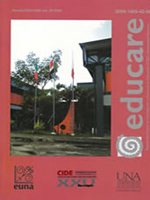Sexual-i-hablando, las representaciones sociales de las estudiantes de Educación Preescolar en relación con la Educación para la Sexualidad
DOI:
https://doi.org/10.15359/ree.12-1.8Keywords:
sexuality, sexual education, genders socialitationAbstract
Due to the current need for information and mainly formation towards the topic about sexuality, it becomes a necessity to learn about the representations that Preschool Education students have around the class taught by the DEB (Division de Educacion Basica); specifically it deals with contents, methodologies and strategies that will for sure influence placing into practice the knowledge acquired in the classroom.
The present investigation aboards the representations that Preschool Education students from the DEB (Division de Educacion Basica) have about the class «Sexual Education» that is taught in the IV bachelor level; departing from the previous information about sexuality that these students have and the expectations related to their field work (student practice in preschool classrooms) about sexual education. All of the previous information has the purpose to reflect about the impact in the pedagogical and subjective level that the methodological proposal and the contents themselves show.
The methodology used, from a qualitative point of view, considered adequate making profound interviews as well as taking into account stories that illustrate experiences for situations lived around sexual education for students sexuality, also the doubts and fears during their field work and the strategies to come over this issue, among others.
The investigation obtained as a result a proposal in content and method for this class. Also, it suggests educational strategies in the classroom coming from the professors in charge, and as a consequence the incorporation of these strategies by the students during their field work. Besides, a test with incomplete sentences (TOI), designed to know the general information that students who will take this class handle, related to sexuality, sexual education, women sexuality, women, adolescents and girls, as well as men sexuality, adolescents and children.
References
Araya, S. (2002). Las representaciones sociales: Ejes teóricos para su discusión. Cuaderno de
Ciencias Sociales 127, 1-82.
Burin, M., Meler, I. (1999). Género y familia. Argentina: Editorial Paidós.
Campos, A. y Salas, J. (2002). El placer de la vida: sexualidad infantil y adolescente: su pedagogía
a cargo de personas adultas. San José, Costa Rica: Lara Segura.
División de Educación Básica. (2002). Plan de estudios en pedagogía con énfasis en educación
preescolar. Heredia: Universidad Nacional.
Gidden, A. (1992). La transformación de la intimidad: sexualidad, amor y erotismo en las sociedades
modernas. Madrid: ediciones Cátedra.
Martín, I. (1986). Acción e ideología. Sicología social desde Centroamérica. San Salvador: UCA
Editores.
Patton, M. (1980). Qualitative evaluation and Research mettods. USA: SAGE publications.
Compilación: Antología Paradigma Cualitativo. Maestría en Educación.
Sandoval, C. (1997). Sueños y sudores de la vida cotidiana: Trabajadores y trabajadoras de la
maquila y la construcción en Costa Rica. San José, Costa Rica: Editorial de la Universidad
de Costa Rica.
Tovar, M. A. (2001). Psicología social comunitaria. Una alternativa teórico metodológica. México:
Editorial Plaza y Valdés.
Vega, M. (2004). Género y Salud. Hacia una atención integral de las y los adolescentes. San José,
Costa Rica: CCSS-PAIA-UNFPA.
Downloads
Published
How to Cite
Issue
Section
License
1. In case the submitted paper is accepted for publication, the author(s) FREELY, COSTLESS, EXCLUSIVELY AND FOR AN INDEFINITE TERM transfer copyrights and patrimonial rights to Universidad Nacional (UNA, Costa Rica). For more details check the Originality Statement and Copyright Transfer Agreement
2. REUTILIZATION RIGHTS: UNA authorizes authors to use, for any purpose (among them selfarchiving or autoarchiving) and to publish in the Internet in any electronic site, the paper´'s final version, both approved and published (post print), as long as it is done with a non commercial purpose, does not generate derivates without previous consentment and recognizes both publisher's name and authorship.
3. The submission and possible publication of the paper in the Educare Electronic Journal is ruled by the Journal’s editorial policies, the institutional rules of Universidad Nacional and the laws of the Republic of Costa Rica. Additionally, any possible difference of opinion or future dispute shall be settled in accordance with the mechanisms of Alternative Dispute Resolution and the Costa Rican Jurisdiction.
4. In all cases, it is understood that the opinions issued are those of the authors and do not necessarily reflect the position and opinion of Educare, CIDE or Universidad Nacional, Costa Rica. It is also understood that, in the exercise of academic freedom, the authors have carried out a rogorous scientific-academic process of research, reflection and argumentation thar lays within the thematic scope of interest of the Journal.
5. The papers published by Educare Electronic Journal use a Creative Commons License:















 The articles published by Educare Electronic Journal can be shared with a Creative Commons License:
The articles published by Educare Electronic Journal can be shared with a Creative Commons License: 



